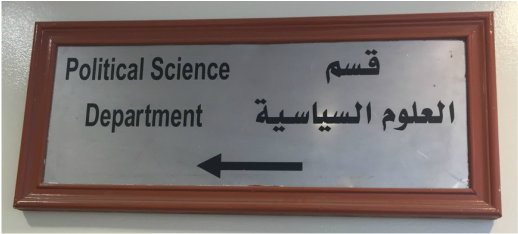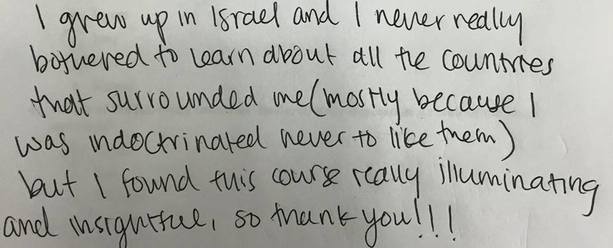Courses taught at Rhode Island College:
Middle Eastern and North African Politics (POL 348)
Gender and Global Politics (POL 350 / GEND 350)
Research Design and Writing in Political Science (POL 308W)
International NGOs and Nonprofits (POL 345 / INGO 300)
Politics of Development (POL 341)
First Year Seminar: Evaluating Headline News (FYS 100)
Unedited comments from peer observations and student evaluations:
"Dr. Noh is very knowledgeable and a great resource to turn to if needed. She expects a lot from her students, and I find it helpful in motivating me to do my best. Her assignments and the comments she left on our assignments were always with the intent for us to learn and not just “busy work.” (Research Design, POL 308W, Student Evaluation)
"This was an excellent class taught by a well-organized, energetic, and effective instructor who was in command of her material and who had the consistent attention and respect of her students. The classroom activities were varied, and each was inherently interesting and valuable for students as they prepare their research designs. This was reflected in the high level of student engagement." (Research Design, POL 308W, Peer Observation)
`In sum, the students clearly were used to a friendly, informal classroom atmosphere where learning is the central goal. Dr. Noh was prepared and in firm control of the classroom and assignment. She demonstrated in this class period a faculty member dedicated to teaching well and building a community of young scholars." (NGOs and Nonprofits, POL 345/INGO 300, Peer Observation)
"Professor Noh is awesome! She is so smart and well-spoken and you can tell she really holds a passion about the topics she is teaching about. Zoom made things a bit rocky, and class participation was sparse, however she was always lecturing us with useful information and definitely used class time in a really effective way. She goes out of her way to schedule private meetings with and additionally always answers emails promptly and politely. She is super approachable and definitely tried to make things easy for us. This course was obviously a bit different because of Zoom, however, she made it work. I would 110% take a class wither again. Great job professor and thanks for a great semester!!!!! :)" (Research Design, POL 308, Spring 2021)
"I LOVED the professor! I thought she was so cool and nice, but she was so interesting and knowledgeable as well! She had real world experience and has a ton of credentials. She presented the information clear and listened to student feedback on how to improve the course. I never had though abstractly about a lot of the ideas we covered in class, and this course has played a significant role in my thoughts about my future and career goals. This course was very valuable to understanding the world around us, and I think it a course all majors should learn about, because of the worldwide effect INGO's/NGO's have on all aspects of our current society. I really enjoyed the course itself, but I think the way the instructor encouraged discussions, as well as provided us information, was what I really enjoyed!" (NGOs and Nonprofits, POL 345/INGO 300, Fall 2020)
"Yuree is clearly passionate about the subject, and there's nothing better seeing a person light up when a certain topic comes up." (Gov't and Politics in the Middle East, PS 157, UCLA)
"I like how she always began the class with current events. For someone like me, who doesn't really keep up with the middle east, this is very helpful to relate what we're learning and apply it to the real life." (Gov't and Politics in the Middle East, PS 157, UCLA)
"Her integration of personal experiences while visiting some of the countries was one of my favorite parts of the course." (Great Powers in the Middle East, PS 132A, UCLA)

